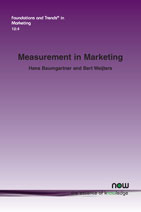Measurement in Marketing
By Hans Baumgartner, The Pennsylvania State University, USA, hansbaumgartner@psu.edu | Bert Weijters, Ghent University, Belgium, bert.weijters@ugent.be
Abstract
We distinguish three senses of the concept of measurement (measurement as the selection of observable indicators of theoretical concepts, measurement as the collection of data from respondents, and measurement as the formulation of measurement models linking observable indicators to latent factors representing the theoretical concepts), and we review important issues related to measurement in each of these senses. With regard to measurement in the first sense, we distinguish the steps of construct definition and item generation, and we review scale development efforts reported in three major marketing journals since 2000 to illustrate these steps and derive practical guidelines. With regard to measurement in the second sense, we look at the survey process from the respondent’s perspective and discuss the goals that may guide participants’ behavior during a survey, the cognitive resources that respondents devote to answering survey questions, and the problems that may occur at the various steps of the survey process. Finally, with regard to measurement in the third sense, we cover both reflective and formative measurement models, and we explain how researchers can assess the quality of measurement in both types of measurement models and how they can ascertain the comparability of measurements across different populations of respondents or conditions of measurement. We also provide a detailed empirical example of measurement analysis for reflective measurement models.
Measurement in Marketing
Measurement in Marketing reviews important issues related to measurement, which is indispensable for empirical research in marketing. The authors distinguish three related but distinct senses to think about measurement and based on this classification discuss issues relevant to each notion of measurement. In one sense, measurement means conceptualizing theoretical variables of interest and choosing appropriate observable indicators of the intended construct. In another sense, measurement means collecting the data necessary for an empirical examination of the theoretical issues under study. In a final sense measurement means constructing a model that relates the data collected in the second step to the latent factors representing the concepts the researcher is interested in, as specified in the first step.
